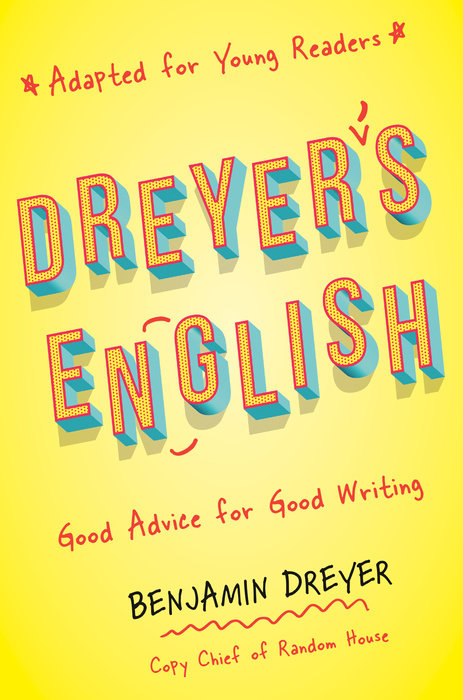Dreyer's English (Adapted for Young Readers)
Author Benjamin Dreyer
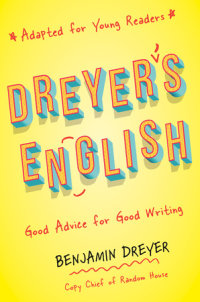
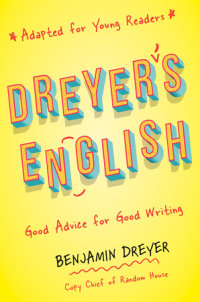
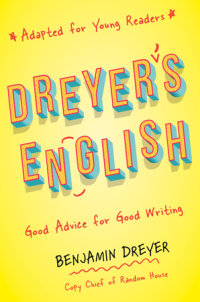
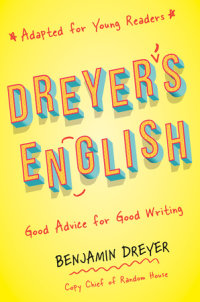
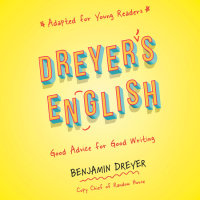
Dreyer's English (Adapted for Young Readers)
Adapted from the New York Times bestseller by Random House's longtime copy chief, this informative and witty guide to writing and grammar, written especially for a younger audience, entertains as well as instructs.
Full of advice, insider wisdom, and fascinating facts, this book will prove to be invaluable to anyone who wants to be confident in their writing skills, or anyone who enjoys the power of language. Explored throughout are the mysteries of using punctuation, word…
Adapted from the New York Times bestseller by Random House's longtime copy chief, this informative and witty guide to writing and grammar, written especially for a younger audience, entertains as well as instructs.
Full of advice, insider wisdom, and fascinating facts, this book will prove to be invaluable to anyone who wants to be confident in their writing skills, or anyone who enjoys the power of language. Explored throughout are the mysteries of using punctuation, word choice decisions, and more, presented in a clear, concise and accessible manner made fun!
Praise for the New York Times bestseller DREYER'S ENGLISH: An Utterly Correct Guide to Clarity and Style
NAMED ONE OF THE BEST BOOKS OF THE YEAR BY O: The Oprah Magazine,Paste, and Shelf Awareness
"Essential (and delightful!)" --People
"Playful, smart, self-conscious, and personal . . . One encounters wisdom and good sense on nearly every page." --The Wall Street Journal
"Destined to become a classic." --The Millions
"Dreyer can help you . . . with tips on punctuation and spelling. . . . Even better: He'll entertain you while he's at it." --Newsday
An Excerpt fromDreyer's English (Adapted for Young Readers)
Chapter 1
The Life-Changing Magic of Tidying Up (Your Prose)
Here’s your first challenge:
Go a week without writing the words
• very
• kind of/sort of
• really
• totally
And you can toss in--or, that is, toss out--“just” (not in the sense of “righteous” but in the sense of “merely”) and “so” (in the “extremely” sense, though as conjunctions go it’s pretty disposable too).
Oh yes: “pretty.” As in “pretty tedious.” Go ahead and kill that particular darling.
And “of course.” That’s right out. And “surely.” And “that said.”
And “actually”? Feel free to go the rest of your life without another “actually.”*
* “Actually” has been a weakness of mine my entire life, speaking and writing, and I realized that it was contagious the first time I heard my two-year-old nephew declare, “Actually, I like peas.”
If you can go a week without writing any of what I’ve come to think of as the Wan Intensifiers and Throat Clearers--I wouldn’t ask you to go a week without saying them; that would render most people silent--you will at the end of that week be a considerably…
Chapter 1
The Life-Changing Magic of Tidying Up (Your Prose)
Here’s your first challenge:
Go a week without writing the words
• very
• kind of/sort of
• really
• totally
And you can toss in--or, that is, toss out--“just” (not in the sense of “righteous” but in the sense of “merely”) and “so” (in the “extremely” sense, though as conjunctions go it’s pretty disposable too).
Oh yes: “pretty.” As in “pretty tedious.” Go ahead and kill that particular darling.
And “of course.” That’s right out. And “surely.” And “that said.”
And “actually”? Feel free to go the rest of your life without another “actually.”*
* “Actually” has been a weakness of mine my entire life, speaking and writing, and I realized that it was contagious the first time I heard my two-year-old nephew declare, “Actually, I like peas.”
If you can go a week without writing any of what I’ve come to think of as the Wan Intensifiers and Throat Clearers--I wouldn’t ask you to go a week without saying them; that would render most people silent--you will at the end of that week be a considerably better writer than you were at the beginning. The Wan Intensifiers add nothing. Avoid them.
I wouldn’t necessarily call that a rule of good writing; writing isn’t always about rules. That said, I have nothing against rules. They’re indispensable when playing Monopoly or chess, and their observance can go a long way toward improving a ride on the subway. The rule of law? Big fan.
The English language, though, is not so easily ruled and regulated. It developed without codification, sucking up new constructions and vocabulary every time some foreigner set foot on the British Isles--to say nothing of the mischief we Americans have wreaked on it these last few centuries--and continues to evolve anarchically. It has, to my great dismay, no enforceable laws, much less someone to enforce the laws it doesn’t have.
Certain prose rules are essentially inarguable--that a sentence’s subject and its verb should agree in number, for instance. Or that in a “not only x but y” construction, the x and the y must be parallel elements. (More on this in Chapter 4: A Little Grammar Is a Dangerous Thing.) Why? I suppose because these prose rules are firmly entrenched, because no one cares to argue with them, and because they help us use our words to their best purpose: to communicate clearly with our readers. Let’s call these reasons the Four C’s: Convention. Consensus. Clarity. Comprehension.
Also simply because a well-constructed sentence sounds better. Literally sounds better. One of the best ways to determine whether your writing is well constructed is to read it aloud. A sentence that can’t readily be spoken is a sentence that likely needs to be rewritten.
A good sentence, I find myself saying frequently, is one that the reader can follow from beginning to end, no matter how long it is, without having to double back in confusion because the writer misused or omitted a key piece of punctuation, chose a vague or misleading pronoun, or in some other way engaged in inadvertent misdirection.
As much as I like a good rule, I’m an enthusiastic subscriber to the notion of “rules are meant to be broken”--once you’ve learned them, I hasten to add.
Right now, let’s attend to a few of what I think of as the Great Nonrules of the English Language. You’ve encountered all of these; you’ve probably been taught them in school. I’d like you to free yourself of them. They’re not helping you; all they’re doing is clogging your brain, making you look self-consciously over your own shoulder as you write. And once you’ve done that, once you’ve gotten rid of these nonrules, hopefully* you can pay attention to more important things.
* Oh, yes indeed. I’ll meet you in Chapter 7: Pet Peeves.
Why are they nonrules? So far as I’m concerned, because they’re largely unhelpful, pointlessly constricting, ill-considered, and useless. Also because they’re generally of questionable origin: devised out of thin air, then passed on till they’ve gained respectable solidity and the ring of authority. Language experts have done their best to get rid of them, but these made-up strictures refuse to go away and have proven more durable than cat videos. Part of the problem, I must add, is that some of them were made up by self-proclaimed but presumably well-meaning language experts in the first place, so getting rid of them can be a bit like trying to get a dog to stop chasing its own tail.
The Big Three
1. Never Begin a Sentence with “And” or “But.”
No, do begin a sentence with “And” or “But,” if it strikes your fancy to do so. Great writers do it all the time. So do even not-necessarily-great writers, like the person who has, so far in this book, done it a few times and intends to do it a lot more.
But first a warning:
An “And” or a “But” (or a “For” or an “Or” or a “However” or a “Because,” to cite four other sentence starters you might often be warned against) is not always the strongest beginning for a sentence, and making a habit of using any of them can make your writing boring and lazy. You may find that you don’t need that “And” at all. You may find that your “And” or “But” sentence will easily attach to the sentence before it with a comma or even, if you’re brave, a semicolon. Take a good look, and give it a good think.*
* I’m always on my guard for monotonous repetition, whether it’s of a pet word--all writers have pet words--or a pet sentence construction. Two sentences in a single paragraph beginning with the same introductory term, especially “But,” are usually one sentence too many.
Let’s test an example or two.
Francie, of course, became an outsider shunned by all because of her stench. But she had become accustomed to being lonely.
Francie, of course, became an outsider shunned by all because of her stench, but she had become accustomed to being lonely.
Which do you think Betty Smith, the author of A Tree Grows in Brooklyn, chose? The former, as it happens. Had I been Smith’s copy editor, I might well have suggested the second, to make one coherent, connected thought out of two unnecessarily separated ones. Perhaps she’d have agreed, or perhaps she’d have preferred the text as she’d written it, hearing it in her head as a solemn knell, a heavy note of sadness. That period does give the second sentence some extra weight, doesn’t it. And authors do often prefer their text the way they’ve written it.*
* I admit that it’s not entirely fair of me to present two isolated sentences and make a ruling about them. When you read, you’re listening to the text not only sentence by sentence but also paragraph by paragraph and page by page, for a larger sense of sweep and rhythm, a lot like the way you listen to a song for its beat and how it makes you feel, not just for those two lines in the refrain that don’t mean anything.
See what I mean about how these nonrules unnecessarily complicate and restrict your writing? You can choose to ignore them--writing is about making conscious, careful choices, and choosing is how you build a book--or a story or a book report.
One thing to add: Writers who are not so adept at linking their sentences habitually toss in a “But” or a “However” to create the illusion that a second thought contradicts a first thought when it doesn’t do any such thing. It doesn’t work, and I’m on to you.
2. Never Split an Infinitive.
To cite a famous split infinitive--and everyone cites this bit from the original Star Trek TV series, so zero points to me for originality--“To boldly go where no man has gone before.”*
* Later and wisely rewritten to “To boldly go where no one has gone before.”
There’s much more--much more--I could say on the subject, but I don’t want to write about the nineteenth-century textual critic Henry Alford any more than you want to read about the nineteenth-century textual critic Henry Alford, so let’s leave it at this: A split infinitive, as we generally understand the term, is a “to [verb]” construction with an adverb stuck in the middle of it. In the Star Trek example, then, an unsplit infinitive version would be “Boldly to go where no man has gone before” or “To go boldly where no man has gone before.” If either of those sounds better to you, be my guest. To me they sound as if they were translated from the Vulcan.
3. Never End a Sentence with a Preposition.
This is the rule that invariably (and wearily) leads to a rehash of the celebrated remark by British prime minister Winston Churchill that British prime minister Winston Churchill, in reality, neither said nor wrote:
“This is the kind of arrant pedantry up with which I will not put.” Meaning, basically, this rule is bogus and I’m not going to follow it, because that’s how you end up with monstrous sentences.
Let me say this about this: Ending a sentence with a preposition (“as,” “at,” “by,” “for,” “from,” “of,” etc.) isn’t always such a hot idea, mostly because a sentence should aim for a powerful finale and not simply dribble off like a rusty old playground water fountain. A sentence that meanders its way to a prepositional finish is often weaker than it ought to or could be.
What did you do that for?
is passable, but
Why did you do that?
has some snap to it.
Still, to tie a sentence into a strangling knot to avoid a prepositional conclusion is unhelpful and unnatural, and it’s something no good writer should attempt and no eager reader should have to contend with.
See what I just did?
The Lesser Seven
I’m sure there are many more secondary nonrules than these seven, but these are the ones I’m most often asked about (or challenged on), so:
1. Contractions Aren’t Allowed in Formal Writing.
This may be a fine rule to observe if you want to sound as if you learned English on your native Mars, but there’s not a goshdarn thing wrong with “don’t,” “can’t,” “wouldn’t,” and all the rest of them that people naturally use, and without them many a piece of writing would turn out stilted and wooden. The likes of “I’d’ve” and “should’ve” may be too loosey-goosey outside casual prose, but generally speaking: Contractions are why we invented the apostrophe, so make good use of both.
Speaking of “should’ve”:
If you want to convey the particular sound of a particular character’s speech--and I warn you, I will have more to say later about the dangers of phonetic dialogue--please use “should’ve,” “could’ve,” “would’ve,” and so forth. Don’t try to get creative with “shoulduv,” “coulduv,” “woulduv,” or some other made-up spelling. They sound precisely the same as the regular spelling, so use the regular spelling and no one will yell at you and we’ll all be a lot happier.
2. The Passive Voice Is to Be Avoided.
A sentence written in the passive voice is one whose subject would, in a sentence constructed in the active voice, be its object. That is:
Active Voice: The clown terrified us.
Passive Voice: We were terrified by the clown.
In a sentence written in the passive voice, the thing that is acted upon is frontloaded, and the thing doing the acting comes at the end. In either case, we can easily agree that clowns are terrifying.
Often, in a sentence constructed in the passive voice, the actor is omitted entirely. Sometimes this is done in an attempt to call attention to a problem without laying blame (“The refrigerator door was left open”) and sometimes, in weasel-like fashion, to avoid taking responsibility: “Mistakes were made,” for instance.
Here’s a nifty trick that comes in handy when you’re assessing your own writing:
If you can add “by zombies” to the end of a sentence (or, yes, “by the clown”), you’ve written a sentence in the passive voice.
All this said, there’s nothing wrong with sentences constructed in the passive voice--you’re simply choosing where you want to put the sentence’s emphasis--and I see nothing objectionable in, say,
The floors were swept, the beds made, the rooms aired out.
since the point of interest is the cleanness of the house and not the identity of the cleaner.
But many a sentence can be improved by putting its true protagonist at the beginning, so that’s something to be considered.*
* By zombies.
3. Sentence Fragments. They’re Bad.
I give you one of my favorite novel openers of all time, that of Charles Dickens’s Bleak House:
London. Michaelmas Term lately over, and the Lord Chancellor sitting in Lincoln’s Inn Hall. Implacable November weather. As much mud in the streets as if the waters had but newly retired from the face of the earth, and it would not be wonderful to meet a Megalosaurus, forty feet long or so, waddling like an elephantine lizard up Holborn Hill. Smoke lowering down from chimney-pots, making a soft black drizzle, with flakes of soot in it as big as full-grown snow-flakes--gone into mourning, one might imagine, for the death of the sun. Dogs, undistinguishable in mire. Horses, scarcely better; splashed to their very blinkers. Foot passengers, jostling one another’s umbrellas in a general infection of ill-temper, and losing their foot-hold at street-corners, where tens of thousands of other foot passengers have been slipping and sliding since the day broke (if this day ever broke), adding new deposits to the crust upon crust of mud, sticking at those points tenaciously to the pavement, and accumulating at compound interest.
Fog everywhere. Fog up the river, where it flows among green aits and meadows; fog down the river, where it rolls defiled among the tiers of shipping, and the waterside pollutions of a great (and dirty) city. Fog on the Essex marshes, fog on the Kentish heights. Fog creeping into the cabooses of collier-brigs; fog lying out on the yards, and hovering in the rigging of great ships; fog drooping on the gunwales of barges and small boats. Fog in the eyes and throats of ancient Greenwich pensioners, wheezing by the firesides of their wards; fog in the stem and bowl of the afternoon pipe of the wrathful skipper, down in his close cabin; fog cruelly pinching the toes and fingers of his shivering little ’prentice boy on deck. Chance people on the bridges peeping over the parapets into a nether sky of fog, with fog all round them, as if they were up in a balloon, and hanging in the misty clouds.
A, Isn’t that great? Don’t you want to run off and read the whole novel now? Do it! I’ll wait here for three months. B, Please count that excerpt’s complete sentences, and let me know when you get beyond zero.*
* You could argue that the second half of the bit beginning “As much mud” constitutes a complete and freestanding sentence. I’m not in the mood to make that argument, but you feel free.
